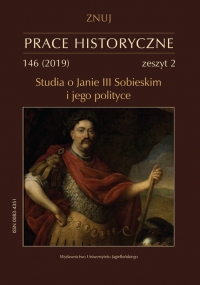DLACZEGO PROPAGANDA POLITYCZNA JANA III SOBIESKIEGO NIE MOGŁA BYĆ SKUTECZNA?
WHY COULD THE POLITICAL PROPAGANDA OF JOHN III SOBIESKI NOT BE EFFECTIVE?
Author(s): Anna CzarnieckaSubject(s): Political history, Government/Political systems, Evaluation research, 17th Century
Published by: Wydawnictwo Uniwersytetu Jagiellońskiego
Keywords: political propaganda; visual propaganda; John III Sobieski; noble democracy; absolute monarchy; elected monarch; patronage; clientelism; royalists; malcontents; opposition; political writings;
Summary/Abstract: The article attempts to answer the question why King John III Sobieski (1674–1696) finally did not reach his main political goal and failed to create a new Polish royal dynasty despite his verbal and visual propaganda as well as diverse methods and means of this propaganda. The author tries to show that the reasons for his defeat did not depend only on the actions of John III as a propagandist but were deeply rooted in the specific political system of the Polish-Lithuanian Commonwealth (monarchia mixta, elected king), in the developed system of clientelism (with domination of magnates’ courts as political and cultural centers under the Royal Court), in the poor condition of the state’s economy as a consequence of wars with Sweden, Turkey and Russia, in the underdeveloped civilization in comparison to Western Europe (a low degree of urbanization and inefficient system of communication) and in the international political situation (interference of France, Empire and the papacy).
Journal: Prace Historyczne
- Issue Year: 146/2019
- Issue No: 2
- Page Range: 417-432
- Page Count: 16
- Language: Polish

